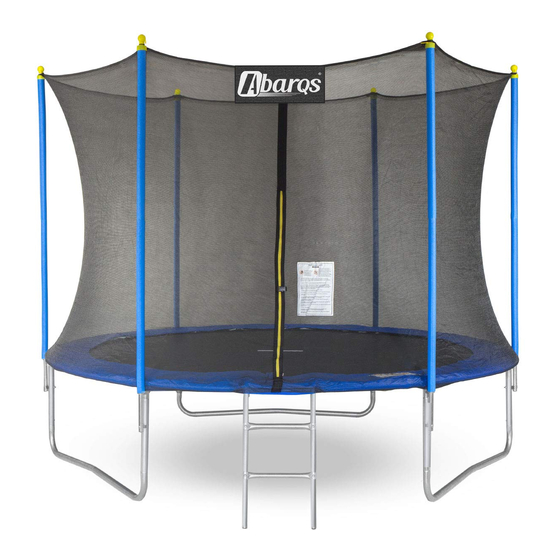- ページ 13
スポーツ&アウトドア Abarqs TRAMPOLINE 14ftのPDF 取扱説明書をオンラインで閲覧またはダウンロードできます。Abarqs TRAMPOLINE 14ft 15 ページ。

Under strong wind conditions the trampoline can be blown off. If you are expecting windy weather,
the trampoline should be moved to a place sheltered from the wind or dismantled. To ensure safety in
normal weather, at least three bindings should be used. Fix the trampoline frame to the ground.
Anchoring the legs of the trampoline to the ground is not sufficient, as the legs may slip out of the
frame's socket.
TRANSPORTING THE TRAMPOLINE
When moving the trampoline you will need the help of another adult. All points-joints should be
securely wrapped with weatherproof tape, for example with adhesive tape. This ensures that the frame
remains intact during movement and prevents movement and disconnection. While carrying, lift the
trampoline slightly from the ground and keep it horizontal. For any other movement, the trampoline
must be dismantled. Once the trampoline has been moved, a full security check must be carried out.
Jumper
Do not use a trampoline if you are under the influence of alcohol or drugs. Don't jump too high. To avoid
tiredness, don't jump too long. Control your jumps. When you use a trampoline, a guardian must be
present. Don't jump alone. Do not wear clothing with hooks or parts that can
get caught in the trampoline. Get on the trampoline up the ladder. Don't jump off the trampoline. Do not
use the trampoline for purposes other than jumping.
Carer:
You are responsible for giving you information about the trampoline. All trampoline users need a
carer, taking into account their age and abilities. Remove all objects that may interfere with the jumper
around the trampoline. Make sure there are any objects under the trampoline, if so, remove them before
using it. If the trampoline is not in use, keep it secured to prevent it from being used unattended.
BASIC Jumping
Jumping
The most important thing about bouncing is that it should be done with control in the center of the mat. The basic
reflection should always be below. High, reckless jumping is forbidden.
This technique allows the jumper to gain control by a quick stop. This is achieved by keeping the feet in contact with
the mat and absorbing the energy of the knee and pelvis jump. This skill should be the first one you acquire and
should be used when you feel insecure, want to finish jumping or when you know you will land away from the middle
of the mat.
Stand in the middle of the mat with your feet set at hip width. Try to make three simple jumps, keeping them low and
in full control. Break your balance, focus your eyes on the perimeter of the trampoline when jumping. Stop jumping,
bending your knees and pushing your pelvis back when your feet come into
contact with the mat.
MOVABLE FRAMEWORK
Arms are very important for correct stroke control. When you jump up your
shoulders go up. They rise to a fixed position for shoulder height and width. They
should stay in this balanced position until the descent begins. Then they mark a
downward movement and go slightly behind the hips, ready to be lifted after the
.
bounce
Kind of jump
The illustration on the right shows three variants: tab, pike and pike. You have to
put on the rebound before a normal foot landing resumes. Practice these simple
variations and concentrate on your ideal form. Make sure your toes are pointed and
your fingers straight. These are simple variations of basic reflection and are very
important for gaining experience in coordinated movement.
The trampoline's user manual is also available at www.abarqs.pl.
:
13
